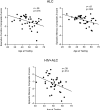Impairments in Component Processes of Executive Function and Episodic Memory in Alcoholism, HIV Infection, and HIV Infection with Alcoholism Comorbidity
- PMID: 27759882
- PMCID: PMC5133188
- DOI: 10.1111/acer.13250
Impairments in Component Processes of Executive Function and Episodic Memory in Alcoholism, HIV Infection, and HIV Infection with Alcoholism Comorbidity
Abstract
Background: Executive functioning and episodic memory impairment occur in HIV infection (HIV) and chronic alcoholism (ALC). Comorbidity of these conditions (HIV + ALC) is prevalent and heightens risk of vulnerability to separate and compounded deficits. Age and disease-related variables can also serve as mediators of cognitive impairment and should be considered, given the extended longevity of HIV-infected individuals in this era of improved pharmacological therapy.
Methods: HIV, ALC, HIV + ALC, and normal controls (NC) were administered traditional and computerized tests of executive function and episodic memory. Test scores were expressed as age- and education-corrected Z-scores; selective tests were averaged to compute Executive Function and Episodic Memory Composite scores. Efficiency scores were calculated for tests with accuracy and response times.
Results: HIV, ALC, and HIV + ALC had lower scores than NC on Executive Function and Episodic Memory Composites, with HIV + ALC even lower than ALC and HIV on the Episodic Memory Composite. Impairments in planning and free recall of visuospatial material were observed in ALC, whereas impairments in psychomotor speed, sequencing, narrative free recall, and pattern recognition were observed in HIV. Lower decision-making efficiency scores than NC occurred in all 3 clinical groups. In ALC, age and lifetime alcohol consumption were each unique predictors of Executive Function and Episodic Memory Composite scores. In HIV + ALC, age was a unique predictor of Episodic Memory Composite score.
Conclusions: Disease-specific and disease-overlapping patterns of impairment in HIV, ALC, and HIV + ALC have implications regarding brain systems disrupted by each disease and clinical ramifications regarding the complexities and compounded damping of cognitive functioning associated with dual diagnosis that may be exacerbated with aging.
Keywords: Alcoholism; Comorbidity; Episodic Memory; Executive Functions; HIV Infection.
Copyright © 2016 by the Research Society on Alcoholism.
Figures





References
-
- Beatty WW, Katzung VM, Nixon SJ, Moreland VJ. Problem-solving deficits in alcoholics: Evidence from the California Card Sorting Test. Journal of Studies in Alcoholism. 1993;54:687–692. - PubMed
-
- Beck AT, Steer RA, Brown GK. Manual for the Beck Depression Inventory-II. Psychological Corporation; San Antonio, TX.: 1996.
-
- Becker JT, Butters N, Hermann A, D'Angelo N. Learning to associate names and faces: Impaired acquisition on an ecologically relevant memory task by male alcoholics. Journal of Nervous and Mental Disease. 1983;171:617–623. - PubMed
-
- Becker JT, Sanchez J, Dew MA, Lopez OL, Dorst SK, Banks G. Neuropsychological abnormalities among HIV-infected individuals in a community-based sample. Neuropsychology. 1997;11(4):592–601. - PubMed
Publication types
MeSH terms
Grants and funding
LinkOut - more resources
Full Text Sources
Other Literature Sources
Medical

